Eve Read online
Prologue
May 23, 2025
My sweet Eve,
As I drove back from the market today, you humming in your car seat and our trunk filled with powdered milk and rice, I saw the San Gabriel Mountains—really saw them for the first time. I’d taken that road before, but this was different. There they were beyond the windshield: their blue-green peaks still and silent, watching over the city, so close I felt like I could touch them. I pulled over just to look.
I know I will die soon. The plague is taking everyone who was given the vaccine. There are no more flights. There are no more trains. They’ve barricaded the roads outside of town and now we all must wait. The phones and internet have long since gone out. The faucets are dry and cities are losing power, one by one. Soon the entire world will be dark.
But right now we are still alive. Perhaps more alive than we’ve ever been. You’re sleeping in the next room. From this chair I can hear the sounds of your music box—the one with the tiny ballerina—playing its last few tinkling notes.
I love you, I love you, I love you.
Mom
Chapter One
BY THE TIME THE SUN SET OVER THE FIFTY-FOOT PERIMETER wall, the School lawn was covered with twelfth-year students. The younger girls leaned out of the dormitory windows, waving their New American flags as we sang and danced. I grabbed Pip’s arm and spun her around when the band played a faster number. Her short, staccato laugh rose above the music.
It was the night before our graduation and we were celebrating. We’d spent most of our lives inside the compound walls, never knowing the forest beyond it, and this was the grandest party we’d ever been given. A band was set up by the lake—a group of eleventh-year girls who’d volunteered—and the guards had lit torches to keep the hawks away. Laid out on a table were all of my favorite foods: leg of deer, roast wild boar, candied plums, and bowls overflowing with jungle berries.
Headmistress Burns, a doughy woman with a face like a feral dog, was manning the table, encouraging everyone to eat more. “Come on! We don’t want to let this go to waste. I want my girls like plump little pigs!” The fat on her arms swung back and forth as she gestured at the spread.
The music slowed and I pulled Pip closer, leading her in a waltz. “I think you make a very good man,” she said, as we glided toward the lakefront. Her red hair clung to her sweaty face.
“I am handsome,” I laughed, furrowing my brow to feign manliness. It was a joke at School, for it had been over a decade since any of us had seen a boy or man, unless you counted the photos of the King that were displayed in the main hall. We begged the teachers to tell us of the time before the plague, when girls and boys attended Schools together, but they only said that the new system was for our own protection. Men could be manipulative, conniving, and dangerous. The one exception was the King. Only he was to be trusted and obeyed.
“Eve, it’s time,” Teacher Florence called. She stood by the lakefront, a gold medal in her aged, weathered hands. The standard teacher’s uniform, a red blouse with blue pants, hung loose on her petite frame. “Gather around, girls!”
The band stopped playing and the air was filled with the sounds of the outside forest. I felt the metal whistle around my neck, thankful to have it should any creature broach the compound wall. Even after all these years at School, I never got used to hearing the dogfights, the distant rat-tat-tat-tat of machine guns, the horrible whining of deer being eaten alive.
Headmistress Burns hobbled over and took the medal from Teacher Florence’s hand. “Now, now, let us begin!” she cried, as the forty twelfth years lined up to watch. Ruby, our other best friend, stood on her tiptoes to see. “You’ve all worked very hard during your time at School, and perhaps no one has worked as hard as Eve. ” She turned to me as she said this. The skin on her face was wrinkled and loose, forming slight jowls. “Eve has proven to be one of the best, brightest students we’ve taught here. By the power given to me by the King of The New America, I present her with the Medal of Achievement. ” As Headmistress pressed the cold medallion into my hands, all the girls clapped. Pip added a shrieking finger-whistle for good measure.
“Thank you,” I said softly. I glanced across the long, moatlike lake, which stretched from one side of the wall to the other. My gaze settled on the giant windowless building beyond it. The following day, after I gave my valedictory speech in front of the entire school, the guards across the lake would extend a bridge and the graduating class would follow behind me, single file, to the other side. There, in that massive structure, we would begin learning our trades. I’d spent so many years studying, perfecting my Latin, my writing, my painting. I’d spent hours at the piano, learning Mozart and Beethoven, always with that building off in the distance—the ultimate goal.
Sophia, the valedictorian of three years ago, had stood at that same podium, reading her speech about our great responsibility as the future leaders of The New America. She spoke about becoming a doctor, and how she would work to prevent future plagues. By now she was probably saving lives in the King’s capital, the City of Sand. They said he’d restored a city in the desert. I couldn’t wait to get there. I wanted to be an artist, to paint portraits like Frida Kahlo or surreal dreamscapes like Magritte, frescoed across the City’s great walls.
Teacher Florence rested her hand on my back. “You embody The New America, Eve—intelligence, hard work, and beauty. We’re so proud of you. ”
The band started a much livelier song and Ruby belted out the lyrics. The girls on the lawn laughed and danced, swinging each other around and around and around until they were dizzy.
“Go on, eat some more. ” Headmistress Burns nudged Violet, a shorter girl with black, almond-shaped eyes, toward the food table.
“What’s her problem?” Pip asked, sidling up beside me. She took the medal in her hands to get a closer look.
“You know Headmistress,” I started, about to remind Pip that our head of school was seventy-five, arthritic, and had lost her entire family when the plague finally ended twelve years ago. But Pip shook her head.
“Not her—her. ”
Arden was the only twelfth year not celebrating. She leaned against the wall of the dormitory, arms crossed. Even in the unflattering gray jumper with the crest of The New American Monarchy sewn over her chest, even scowling, she was still beautiful. While most of the girls in School kept their hair long, she’d chopped her black mane into a short bob, making her fair skin look even fairer. Her hazel eyes were flecked with gold. “She’s up to something, I know it,” I told Pip, not taking my eyes off her. “She always is. ”
Pip ran her fingers over the smooth medallion. “Someone saw her swimming across the lake. . . . ” she whispered.
“Swimming? I doubt that. ” No one in the compound could swim. We’d never been taught.
Pip shrugged. “Who knows with her. ” While most of the twelfth years had come to School at five years old, after the plague ended, Arden had arrived at School at eight, so there had always been something different about her. Her parents had given her over to the School until they could establish themselves in the City of Sand. She loved to remind students of the fact that, unlike the rest of us, she wasn’t an orphan. When she finished learning her trade, she would retire in her parents’ new apartment. She wouldn’t have to work a day in her life.

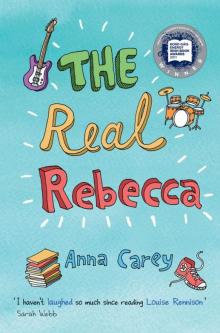 The Real Rebecca
The Real Rebecca Once
Once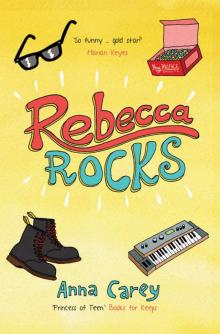 Rebecca Rocks
Rebecca Rocks Blackbird
Blackbird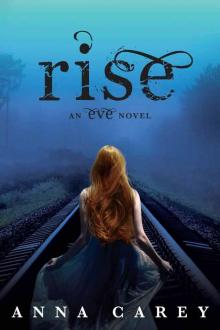 Rise
Rise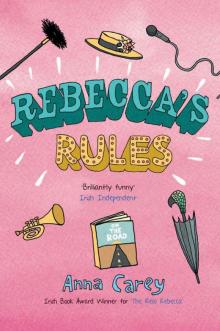 Rebecca's Rules
Rebecca's Rules Deadfall
Deadfall Eve
Eve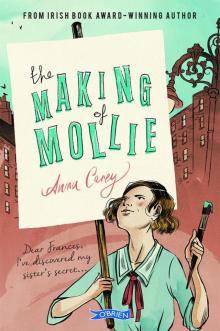 The Making of Mollie
The Making of Mollie Sloane Sisters
Sloane Sisters Survival of the Fiercest
Survival of the Fiercest This Is Not the Jess Show
This Is Not the Jess Show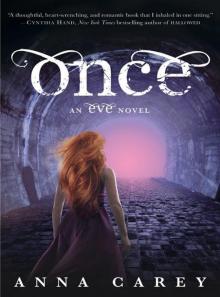 Once: An Eve Novel
Once: An Eve Novel